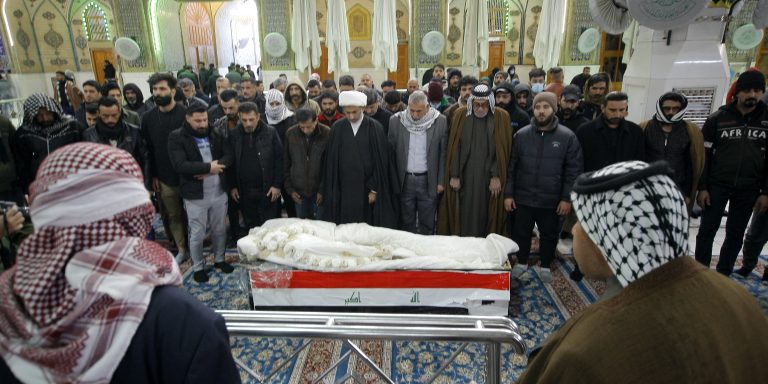INTELBRIEF
January 25, 2022
IntelBrief: Islamic State Attacks in Syria and Iraq Demonstrate a Building Momentum

Bottom Line Up Front
- With a recent flurry of activity across Syria and Iraq, the Islamic State (ISIS) is showing signs that its strategic patience is beginning to pay dividends.
- The assault should serve as a wakeup call for countries to repatriate their citizens, even while still determining the preferred procedures for rehabilitating or prosecuting these individuals.
- In neighboring Iraq, ISIS fighters attacked an army outpost in Diyala province close to al-Udhaim, northeast of Baghdad, resulting in the death of 11 Iraqi soldiers.
- ISIS has capitalized on its attacks in Syria and Iraq to spread new propaganda, as it attempts to recruit new members and reactivate quasi-dormant networks throughout the region.
With a recent flurry of activity across Syria and Iraq, the so-called Islamic State (ISIS) is showing signs that its strategic patience is beginning to pay dividends. Beginning Thursday through this weekend, ISIS militants laid siege to the Hasakah Provincial Internal Security Forces detention center, controlled by the Syrian Democratic Forces (SDF) and located in northeastern Syria. ISIS fighters detonated multiple vehicle-borne improvised explosive devices (VBIEDs) in tandem with a complex assault by as many as 200 insurgents. The operation was well-resourced and well-planned and, for those who have studied ISIS strategy for years, eerily reminiscent of the group’s “Breaking the Walls” campaign that helped catapult it to global prominence more than eight years ago, when many of its top leaders were freed through a series of jail breaks. ISIS fighters involved in the fighting to take control over the prison used suicide attacks, sniper fire, and other asymmetric means to challenge the SDF. Reports suggest that British and American Special Forces were involved in the operation to retake the prison, as fighting continued for several consecutive days. Although reports are conflicting, there could be as many as 175 ISIS militants dead, hundreds recaptured, and an unknown number escaped. Dozens of SDF members were killed in the fighting and tens of thousands of civilians displaced.
The Hasakah prison is believed to house approximately 3,500 prisoners, most of them captured during the final offensive to reclaim territory conquered by ISIS during the height of its so-called caliphate. Overall, there are believed to be more than 12,000 ISIS fighters held in a series of prisons dotting northeast Syria. Last week’s prison break is just the most recent reminder that the SDF lacks the manpower and resources to function as prison guards for the foreseeable future. Most calls pleading with the international community for assistance have fallen on deaf ears. The assault should serve as a wakeup call for countries to repatriate their citizens, even while still determining the preferred procedures for rehabilitating or prosecuting these individuals. UNICEF reported that approximately 850 children, with some as young as 12 years old, were being held in the north wing of the prison. With such a heavy, albeit necessary, focus devoted thus far to women and girls connected to ISIS, there has been a genuine neglect of what should be done with the boys in these prisons. Most Western states will not consider repatriating young men, even young teenagers, in the same way they have done with women and girls. And with ongoing geopolitical crises in Afghanistan and Ukraine, it seems unlikely that repatriation will receive the urgent policy attention it desperately requires.
In neighboring Iraq, ISIS fighters additionally attacked an army outpost in Diyala province close to al-Udhaim, northeast of Baghdad, resulting in the death of 11 Iraqi soldiers. ISIS fighters have used the Hamrin mountains as a safe haven, much in the same way ISIS militants in Syria rely on the central Syrian desert, to rebuild, train, and plot new attacks. ISIS fighters in Iraq, especially those in and around Kirkuk, have resorted to kidnapping for ransom to maintain revenue streams. ISIS has relied on connections to Turkey to facilitate money laundering and front companies that help the group remain financially viable. Its leaders in Iraq are also looking to exploit sectarian tensions and grievances among Iraqi Sunnis to reinforce the group’s ranks, a strategy that has proven successful in the past.
ISIS has capitalized on its attacks in Syria and Iraq to launch a propaganda offensive, which has mobilized online supporters over the past week. Some messages have called for riots and prison breaks in other detention centers where ISIS members and their families are being held, including al-Hol. The prison break was perhaps ISIS’s most sophisticated operation since its last sliver of territory was retaken near Baghouz, Syria in the spring of 2019. Since that time, ISIS has largely gone underground, although it has waged a low-level campaign of assassinations, hit-and-run attacks, and roadside bombs. Over the course of 2021, Islamic State affiliates carried out large-scale operations in Iraq, Nigeria, Afghanistan, and Mozambique, with a significant decline in overall attacks in Syria. The intensity of the fighting suggests that the prison break operation was well-planned and could signify the beginning of a broader offensive by the group, aimed not at retaking swaths of territory, but at generating momentum and sowing instability across the Levant. The attacks are a clear attempt to recruit new members and reactivate quasi-dormant networks throughout the region.